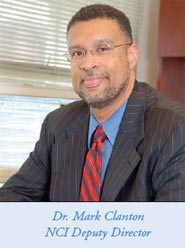Meetings and Events
Spring 2013
Vol. 8, Issue 1
Winter 2013
Vol. 7, Issue 2
Spring 2012
Vol. 7, Issue 1
Spring 2011
Vol. 6, Issue 1
Fall 2011
Vol. 6, Issue 2
Spring 2010
Vol. 5, Issue 1
Fall 2010
Vol. 5, Issue 2
Spring 2009
Vol. 4, Issue 1
Fall 2009
Vol. 4, Issue 2
Spring 2008
Vol. 3, Issue 1
Fall 2008
Vol. 3, Issue 2
Fall 2007
Vol. 2, Issue 2
Winter 2007
Vol. 2, Issue 1
Summer 2006
Vol. 1, Issue 2
A Conversation with:
Mark Clanton, M.D.

NCI Deputy Director and Deputy Director for Cancer Care Delivery Systems
Please say a little about the scope of your responsibilities as Deputy Director of the NCI and how complementary and alternative medicine (CAM) fits into those duties.
I lead the trans-NCI strategic scientific planning and prioritization process. My portfolio includes 13 offices, centers, and divisions with a focus on cancer prevention, cancer control, international cancer control, and health services research. My principle efforts are focused on applying systems thinking to increase the impact that NCI has on the quality, cost, and reimbursement of cancer care, as well as the reduction of cancer health disparities. One office to which I provide strategic leadership is OCCAM. OCCAM functions as a coordinating office for the Institute's research and information activities regarding CAM, so its work supports the efforts of programs throughout NCI's intramural and extramural components.
Through my exposure to OCCAM's programs and projects, I have found that CAM research and information issues are relevant in some way to most, if not all, of the 8 strategic objectives that we have elaborated for the Institute in The NCI Strategic Plan for Leading the Nation. Given my focus on cancer care delivery, I have taken particular notice that a significant percentage of the grants in NCI's CAM research portfolio relate to our objective to improve the quality of cancer care, however, an even larger percentage of grants are relevant to NCI's strategic objective to accelerate progress in cancer prevention. Many of these details are being prepared for public dissemination in the first NCI's CAM Annual Report: Fiscal Year 2005.
Recently, you've been invited to speak at two international CAM meetings: Non-Conventional Treatments for Cancer Patients held by the AIMaC, the Italian equivalent to the Cancer Information Service, and the Traditional Chinese Medicine and Cancer Research: Fostering Collaborations; Advancing the Science. What do you see as potential collaborations that can be accomplished through dialogue with international partnerships?
From my participation at those meetings, it was apparent to me that CAM is an international phenomenon. Issues related to CAM vary from country to country, but there are common connecting elements. For example, there is a universal need to generate an evidence-base for clinical practice through rigorous cancer CAM research. We should not work in silos but share our resources and advancements through international partnerships.
Another similarity amongst countries is the necessity for high quality information products on CAM therapies for cancer geared for the general population. As a result of this particular need, Thinking About Complementary and Alternative Medicine, a booklet jointly produced by NCI and the National Center for Complementary and Alternative Medicine that gives an overview of the various cancer CAM therapies and how to find credible CAM information resources, has been translated into Italian and French.
International connections and collaborations are important as they give us an opportunity to learn from the experience of others.
Are there specific ways in which NCI can make a meaningful impact on the field of cancer CAM? What can NCI do to further research in the field of CAM?
The National Cancer Institute has a mandate and responsibility to support the development of scientific knowledge that improves the care of cancer patients. Since many cancer patients, estimated to be as high as 80%, use CAM resources, NCI will continue to fund research into CAM practices in cancer patients. In addition to maintaining a research portfolio in cancer CAM, OCCAM will continue to work with other programs within NCI, such as the Cancer Centers Branch and the Community Oncology and Prevention and Trials research group, and collaborate with other NIH Institutes and Centers to support cancer CAM research. We also have an important role to play in educating health care practitioners and consumers about the evolving research in the field of CAM and cancer.





